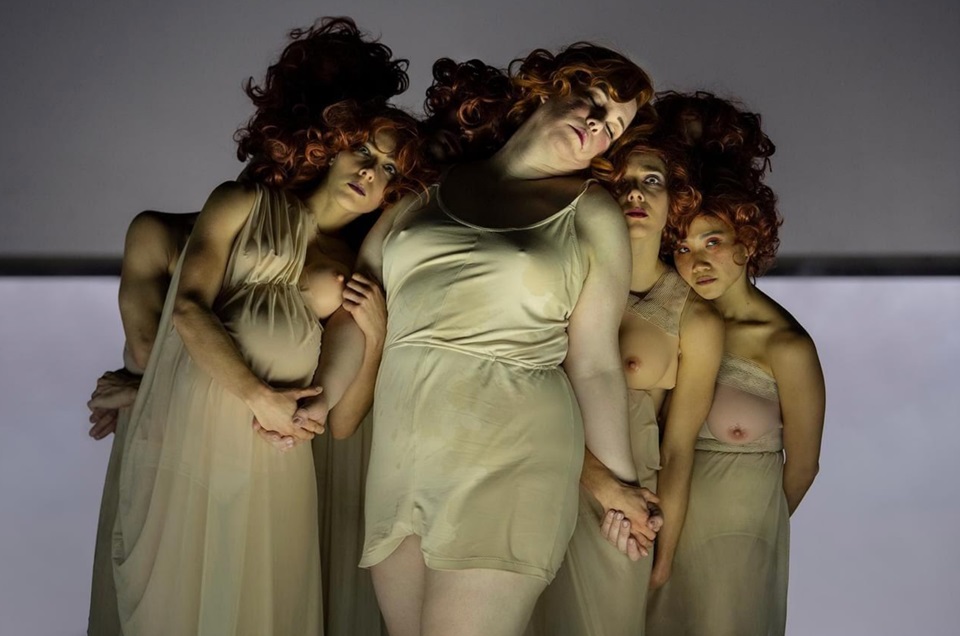
Moviegoers back in 2015 who saw the film The Danish Girl may have first heard the story there of Lili Elbe, the first known recipient of gender-affirming surgery in the early 1930s, then uncharted, experimental medical territory. The subject was not entirely unknown, as David Ebershoff had published a novel in 2000 by the same name. Eddie Redmayne starred in the film as Lili Elbe (1882-1931), known before transition as the acclaimed Danish landscape painter Einar Wegener. As Gerda Wegener (1886-1940), whom she married in 1904, Alicia Vikander won the Best Supporting Actress Award. Gerda Wegener herself was an important artist, considered the Danish pioneer of Art Deco and a sought-after portraitist.
Lili Elbe, the new opera in two acts by American composer Tobias Picker, with a libretto by his husband Aryeh Lev Stollman (they were married by Supreme Court Justice Ruth Bader Ginsburg), had its world premiere on October 22, 2023, at Theater St. Gallen in Switzerland. The entire production was filmed for worldwide audiences and can now be seen either on YouTube or on OperaVision (available through June 8, 2024).

The actress Anna Larsen of the Royal Danish Theater has just premiered the role of Orpheus in a new play. The story of the lovestricken poet who loses his bride Eurydice is eerily resonant with Gerda and Lili. Gerda is painting her portrait, but unable to come for her last sitting, which will be the centerpiece of a new exhibition, Anna suggests that Gerda ask her husband Einar to assume her pose. It is then that Einar makes a profound self-discovery, never before acknowledged, though hinted at by recollections of a sensitive childhood. Like Orpheus compelled to look back at Eurydice, Lili in her new sense of identity can never again help turning away from her true self, even to the shock and embarrassment of their friends and family.
Lili decides to follow up on an introduction to Professor Warnekros, who agrees to work with her at the Municipal Women’s Clinic in Dresden and help her fully live her life as a woman after a series of operations. Warnekros has his own agenda, hoping to win a Nobel Prize for his pioneering medical work.
After her first surgery, Lili has a dramatic encounter with the King of Denmark and receives a royal decree confirming her gender identity, thus legally dissolving her marriage to Gerda, since same-gender marriage was unheard of at the time. As a pioneer of gender-affirmation surgery, Lili endures the terrible pains and dangers of the limited medical science of her day, ultimately dying from complications after a subsequent surgery intended to place female reproductive organs in her body.
With their marriage annulled, though their mutual love remains undiminished, both Lili and Gerda find partnership elsewhere, Lili with the Parisian perfumier Claude LeJeune, and Gerda with the Italian Major Fernando Porta, a cad who will squander her money and leave her in poverty. At the end of the opera, Lili and Gerda declare their great and everlasting love for each other, Lili’s death a kind of apotheosis, having finally become the woman she yearned to be.
The opera is given a stunning production, directed by Krystian Lada, who also designed imaginative 1920s Art Deco décor for the stage, costumes by Bente Rolandsdotter, and lighting by Alexandr Prowalinski. Conductor Modestas Pitrenas leads the St. Gallen Symphony Orchestra. The running time is 135 minutes.
The two principal roles of Lili and Gerda are performed, respectively, by trans baritone Lucia Lucas and Sylvia D’Eramo. Other roles include the actress Anna Larsen, various friends and family members, nurses, other patients at the clinic, chorus members, and Dr. Warnekros (bass Msimelelo Mbali).
Owing to its topicality, Lili Elbe must be deemed a true 21st-century opera. Its musical language is contemporary, expressive, often reminiscent both of the Jazz Age and the popular operetta genre of its time, and intensely, personally transcendent.
The role of Dr. Warnekros prompts a number of reflections on the era. It was the height of renown for Dr. Magnus Hirschfeld’s Institute for Sexual Science in Berlin, which did revolutionary research and support for the lives of non-gender conforming persons, where considerations of sexuality, identity, and even reassignment were discussed every day. It was one of the first targets of Nazi repression, its whole library thrown onto a bonfire and publicly burned in 1933. Yet there is something also somewhat alarming about this Doctor Warnekros in that as a self-declared paragon of the greatness of German science, he grants himself license to conduct experiments with no supervision by medical authorities. A critical scene in the opera concerns a poor woman who’s already had two children out of wedlock who have both been put up for adoption. She is subjected to an operation she has not consented to, involving the removal of her ovaries and womb for transplant into Lili’s body, with creepy premonitions of the later Nazi death camps’ Dr. Josef Mengele, control over women’s bodies, euthanasia, and medical experiments. The fact that this character is portrayed by a Black singer gives special poignancy to the role in light of the scandalous Tuskegee medical study of syphilitics and the rampant abuses of African-American women’s reproductive agency. Much to ponder here—intentional, I am sure, on the part of the opera’s creators.
A viewer will be well rewarded by an encounter with this bold and visually gorgeous new operatic undertaking. The trailer can be viewed here. An aria for Gerda, “I See a Woman,” can be heard here. An introduction to the creation of the opera can be seen here.
We hope you appreciated this article. At People’s World, we believe news and information should be free and accessible to all, but we need your help. Our journalism is free of corporate influence and paywalls because we are totally reader-supported. Only you, our readers and supporters, make this possible. If you enjoy reading People’s World and the stories we bring you, please support our work by donating or becoming a monthly sustainer today. Thank you!










